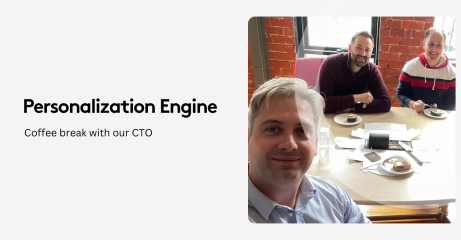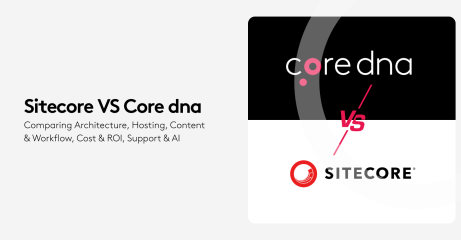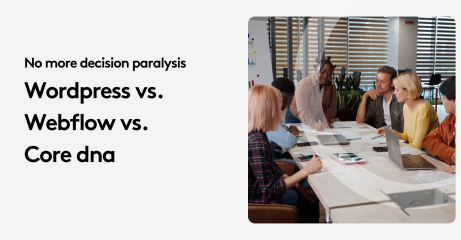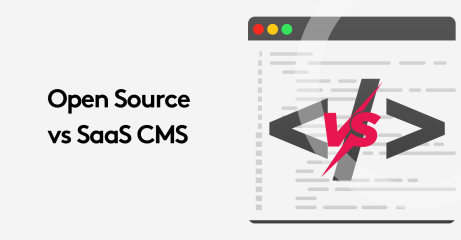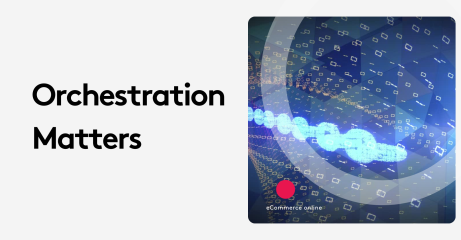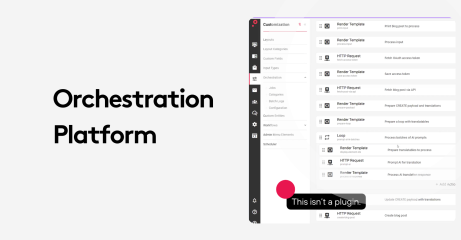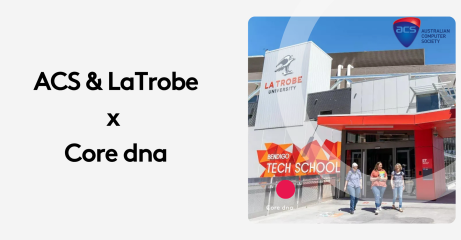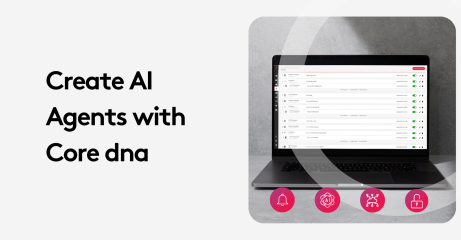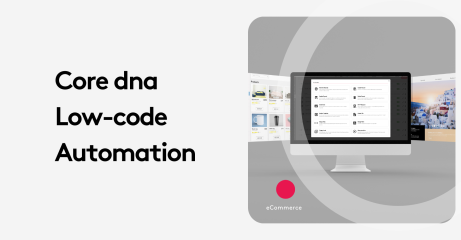Recently, I’ve been reviewing our finances, and thanks to Core dna, we’ve managed to cut $100,000 from our budget—funds we can now use to give back to the community. Core dna has made things so much easier”
No code, big wins! How to built an LMS Platform
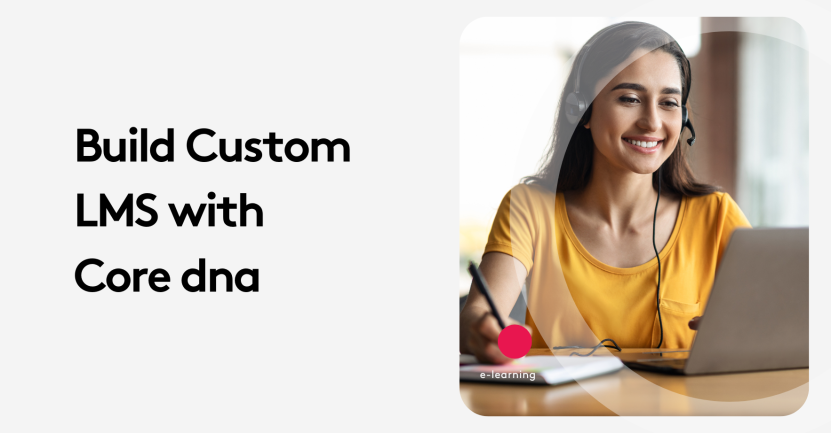
Building an enterprise Learning management systems or LMS often seem like this complicated, developer heavy, labor intensive project.
After all, an LMS isn’t just a single feature—it’s a dynamic online hub where you deliver courses, track learner progress, and manage enrollments.
At Core dna we want to prove you wrong.
With the right platform, it can all be a walk in the park. This is where Core dna’s flexibility comes into play.
No custom coding here, Core dna’s “custom entities” are light at the end of the tunnel. Think of them as building blocks that you get to rearrange, modify and create.
The pieces will help you create the platform that fits your business and not the either way around. And all of it almost at the blink of an eye. Ok, Ok not really but way faster than any other platform.
We recently did a proof of concept for one of our clients and built a custom LMS using our Core dna platform.
In this article, we will share with you how Core dna transforms the way you build online experiences. From a sophisticated LMS, to designing entirely new online solutions.
On this page:
What is a learning management system?
An enterprise Learning Management System (LMS) is essentially a virtual classroom. It's an online environment designed to host educational content, manage student enrollments, track progress, and assess learning outcomes.
It is a beautiful way to make education accessible to all and offer diverse learning opportunities.
Organizations with an LMS usually offer an array of online training courses, certification programs, professional development modules, and more.
However, operating online in the time of Content is king means organizations need more than just an LMS. They need an LMS that can offer powerful CMS capabilities to support content creation to boost visibility and online presence.
Many traditional LMS systems impose strict structures and workflows that can hinder creativity and the potential for growth.
If new needs arise such as introducing new types of content, adjusting your course hierarchy, or adding complex functionalities such as custom quiz logic, or dynamic recommendations, more often than not the answer is hours of coding and expensive, time-consuming development.
Instead, a flexible platform gives you the freedom to modify elements, experiment with features, and evolve your platform as needs change, all from the admin portal.
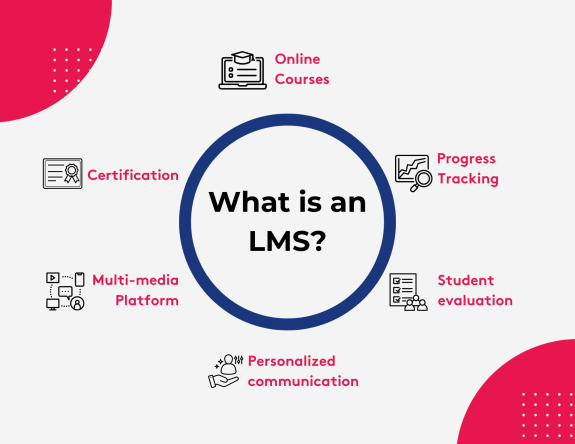
How does Core dna fit in the LMS world?
When we built Core dna, the number one requirement of flexibility. We wanted a platform that is modular and malleable to fit the needs of diverse clients.
So what we ended up building is a powerful foundation designed to help you build a wide range of online solutions.
While many platforms specialize in either LMS or CMS or eCommerce one area, Core dna’s power lays in its versatility to create anything from an enterprise Learning Management System to sophisticated e-commerce portals, corporate intranets, or community-based platforms.
This flexibility is intentional and is powered by our “custom entities”, the building blocks for any type of content or functionality you need.
If you are not familiar with custom entities, we will give you a detailed explanation below but you can envision them as little particles just waiting to have a purpose.
These entities could represent courses, products, blog posts, user profiles, or even entire testing modules. Instead of relying on rigid, pre-built structures, you have a flexible toolkit that adapts to your vision.
But adaptability doesn’t mean complexity.
Non-technical team members can configure data structures, manage fields, and adjust layouts all within the intuitive admin interface.
Whether you’re launching a training portal today and adding a subscription-based membership service tomorrow, Core dna scales seamlessly with your plans. This flexibility leads to faster development cycles, fewer technical hurdles, and cost savings over time.
In short, Core dna isn’t limited to being just an LMS or a CMS—it’s a platform that evolves alongside your ideas, enabling you to stay ahead in an ever-changing digital landscape.
The Power of Custom Entities explained to people like me who don’t get the technical stuff.
Custom entities are the secret sauce that makes Core dna so flexible and help us bring your business to life.
When thinking about the kind of platform Core dna should be, “freedom to build anything with low-code” was the number one requirement.
So Instead of being stuck with predefined templates or limited data structures, we imagined Core dna as a set of digital building blocks that you can use to create your own world.
You can add as many custom entities as your heart desire. Look at them as lego pieces that you can add to your structure to reach your desired outcome. Your model can be shaped into whatever you need—courses, lessons, test questions, user profiles, orders, or any other type of content.
These aren’t just abstract concepts; they’re practical tools that help you quickly model and manage data without writing a single line of code.
And who benefits the most: non-technical teams! Guys, this is a game-changer!
Creating a new custom entity doesn’t require a developer. Everything happens within Core dna’s admin interface.
Let’s say you want to add a new content type called “Workshops.” Just open the admin panel, define the fields you need (like title, description, date, or instructors), and save.
Instantly, you’ve created a new entity type that you can reuse, filter, or rearrange as you wish.
And of course nothing is set in stone. If you decide later that “Workshops” also need an “Attendee Limit” field, you can add it in minutes. Need to rename “Lessons” to “Modules”? Easy. Want to rearrange how these entities appear in your admin sidebar for better organization? in a few clicks and it's done.
In short, custom entities let you define, refine, and evolve your platform’s structure on the fly. All you really need is a good front end designer and you are all set.
A Real Example: LMS FOR
The best story to illustrate Core dna’s power is the team building a fully functional Learning Management System (LMS) in a remarkably short time—and with minimal coding. (STAY TUNED THE DEMO IS COMING)
When a client came to us and asked if we could build them an LMS within our CMS and eCom platform, the immediate answer was “oh sure, let’s us build you a proof of concept”.
Trust me this quick answer from our team surprised even our CEO.
But yes, when the team is so confident it can achieve something, let me tell you they will 1000% make it happen.
They leveraged custom entities and simple configurations in the admin area to assemble the entire LMS framework.
Beginning with a blank slate, they created courses, textbooks (learning modules), test banks, and enrollments:
Courses: Each course came with its own unique settings and requirements, all managed directly in the admin interface.
Textbooks (Learning Materials): The learning content for each course was organized into units and lessons. Students could track their progress through these materials, and all of it was handled through custom entities. No custom code, just a few clicks in the admin to set up and manage the structure.
Test Banks and Questions: To assess knowledge, the team set up a pool of test questions as custom entities. Connecting these questions to specific courses was as easy as selecting options in the admin panel. Adding a new question simply meant filling out a form—no complicated coding involved.
Enrolement: When users purchased a course, the system automatically generated enrollments and tracked each learner’s progress. Orders, too, were treated as custom entities, making it simple to assign courses to purchase and manage the entire transaction flow within the platform.
Game changer for Save a Life
All hands on deck turned Save a Life’s vision into reality with a Learning Management System (LMS) —built in just a week and a half.
And to tie everything together, the little cherry on top, we added a few “hooks” (small automated workflows) and front-end templates to make it look good.
This allowed for smooth progress updates, score tracking, and easy navigation—all without developers having to hard-code intricate logic.
And this is only a POC. Wait until we launch the final product!
This example proves that building a flexible, scalable LMS isn’t reserved for specialized or costly platforms.
With Core dna’s custom entities and intuitive admin interface, new features and content types can be introduced rapidly, ensuring your learning platform can evolve as fast as your business needs.
Why This Matters for Your Business
Imagine taking the same flexibility that allowed us to build an LMS in record time and applying it to other facets of your business.
Perhaps you’re looking to create a customized membership platform with tiered access levels, exclusive content, and user-specific recommendations.
Or maybe you want to launch a specialized training portal where learners not only watch videos but also receive personalized course recommendations based on their interests, performance, or previously completed units.
You might even consider adding a marketplace for digital goods—such as eBooks, downloadable templates, or premium webinars—right alongside your training materials.
With Core dna’s custom entities, all of these possibilities become much easier to realize. Instead of spending weeks or months working with developers to produce custom code, you can frequently achieve the desired functionality directly within the admin interface.
Need a new entity for managing digital products? Simply create one and define the fields you need. Want to add filters to help users navigate your membership offerings?
By doing this, you’re not only saving time and money—you’re also streamlining the entire innovation process. Saad, Digital marketing manager of YMCA Toronto experiences this first hand:
Marketing teams can experiment with new content formats. Operations staff can refine workflows on the fly. Customer support can leverage new data structures to assist users more effectively.
The ability to adapt and extend your platform through custom entities significantly lowers complexity. It empowers your team to focus on strategy, content, and user experience, rather than getting bogged down by technical roadblocks.
The result: a more agile, responsive business that can pivot quickly to meet emerging opportunities and challenges.
Future-Proofing Your Online Platform
Part of making ure your business is successful is choosing a platform that can grow with you and not against you. A scalable platform for online business will ensure that you can grow and adapt fast to the market and always stay competitive.
---> You can checkout our RFP guide with all the questions to ask your vendors for an informed decision.
Custom entities are the features that bring the flexibility and scalability to a platform. It means, you are not locked into rigid templates, you have the freedom to make changes whenever business conditions shift.
Need to introduce a new type of content next year—maybe a specialized course format, a new product category, or an interactive quiz?
Just create another custom entity and assign it the fields and logic you need. Within minutes, you’ve expanded your platform’s capabilities without writing complex code.
The flexibility empowers non-technical to achieve high-tech outcomes and translates directly into long-term savings and strategic agility.
The LMS as Just One Example
While the example we’ve explored focuses on building an LMS, the truth is that Core dna can help you build virtually any type of online platform.
Imagine it, we can build it.
Core dna brings online business to life
From streaming services to knowledge bases, membership sites to multi-tiered training programs, Core dna’s flexible, entity-driven architecture and admin-driven configuration put you in control.
If you need an LMS or any other flexible online solution, consider Core dna. It’s not just about creating a platform; it’s about creating a platform that can grow, adapt, and thrive right alongside your business.

